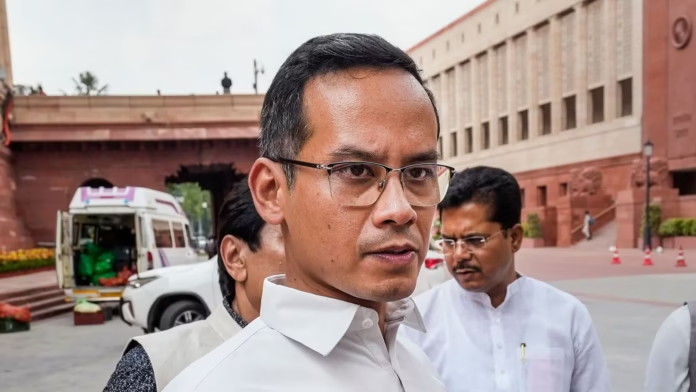Assam Chief Minister Himanta Biswa Sarma launched a fierce attack on Congress MP Gaurav Gogoi during an election rally in North Salmara, Bongaigaon district on Friday. Sarma questioned Gogoi’s connection to India, claiming the Congress leader is “living like a tourist” in the country while three of his family members hold foreign citizenship.
The Chief Minister’s comments drew loud reactions from the crowd as he accused the Congress leadership of having no emotional or practical investment in the state’s future. He alleged that Gogoi, despite representing Assam in Parliament, does not share the everyday concerns of the people and treats his political role like an occasional visit rather than a full-time responsibility.
Sarma said the Congress party has been reduced to a shadow of its former self in Assam and leaders like Gogoi do not resonate with the common citizen. He told the gathering that real leadership comes from being rooted in the land and understanding the aspirations of the people, not from flying in occasionally to make speeches and fly back out. The Chief Minister argued that while BJP leaders are continuously engaged on the ground, opposition leaders only surface during elections.
Referring to Gogoi’s family background, Sarma pointed out that while Gaurav Gogoi speaks of Indian politics, his own household is aligned more with foreign nations than with India. He did not mention names but said that three members of Gogoi’s family hold foreign citizenship. He claimed this reveals a larger issue of loyalty and commitment to India’s future. The remark was intended to raise doubts about Gogoi’s long-term intentions and connection to Assam.
Sarma further said that the Congress party cannot offer genuine leadership because its senior figures have little stake in India’s future. He claimed that the disconnect is evident in the way Congress campaigns are run and the type of candidates they promote. According to him, the Congress is fighting to stay relevant while the BJP is focused on development and delivering results.
The Chief Minister also challenged Gogoi to reveal the details of his family’s citizenship status to the people of Assam. He said if Gogoi believes in transparency and public service, then he should clarify the facts rather than hide behind political statements. Sarma claimed that Assam’s voters have the right to know whether those asking for their votes truly belong to the same soil.
The rally in North Salmara was part of the BJP’s aggressive push in western Assam, where the party is trying to consolidate its influence ahead of the upcoming elections. Sarma used the platform to contrast the BJP’s policies and initiatives with what he described as the Congress’s confused and elitist approach. He said the BJP has built roads, improved schools, supported farmers, and strengthened peace in the region.
Sarma’s speech also included a call to voters to remain alert to what he termed as “outsider politics”—leadership without accountability. He said that under the BJP’s rule, governance has become more accessible and rooted in people’s needs, unlike in the Congress era, which he said was defined by distance and delay.
Gaurav Gogoi has not yet responded to the Chief Minister’s comments, but Congress sources said that the attack was a sign of nervousness within the BJP. They added that the Congress MP continues to work for the people of Assam and that personal remarks reflect the BJP’s desperation in the face of a growing opposition campaign.
As the political rhetoric intensifies across Assam, Sarma’s remarks have sparked renewed debate on the personal backgrounds of public figures and the responsibilities they hold. With elections drawing closer, such confrontations are expected to dominate the public discourse.
Chief Minister Himanta Biswa Sarma also used the rally to paint a broader picture of what he called the Congress party’s detachment from Indian cultural values. He said leaders like Gaurav Gogoi have failed to promote or preserve Assamese identity, and instead, appear more comfortable aligning with Western ideologies that do not resonate with the state’s traditions or priorities.
Sarma argued that the upcoming elections are not just about governance but also about asserting Assam’s pride and ensuring that only those who are deeply connected to the region’s ethos represent it. He told the crowd that no party can claim to stand for Assam if its leaders treat the state as a temporary assignment or a political pit stop.
He also criticised Congress for lacking a coherent vision for the region’s youth. According to Sarma, while the BJP has focused on job creation, skill development, and educational reforms, the Congress continues to rely on outdated slogans without offering real solutions. He said the future of Assam requires dynamic leadership that thinks ahead, not just echoes past glories.
Adding a note on national security, Sarma said Assam cannot afford to be represented by those whose family roots are not firmly planted in the country. He said that in times of geopolitical tension, India needs leaders who are fully committed and not distracted by foreign affiliations or dual loyalties.
He closed his address with a call for unity among Assamese voters, urging them to reject leaders who, in his words, “remember Assam only during elections.” He said real progress depends on consistent effort and a genuine sense of belonging—qualities he claimed were lacking in Congress candidates.

